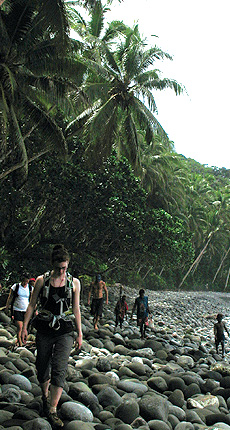Birds of a Feather
The first recipient of the Aresty Chair in Tropical Ecology studies tropical birds for clues to biodiversity concerns.
Alumni Jeffrey and Patricia Pickton Aresty first met as UM biology students conducting field research in Ecuador. Thus began not only a wonderful romance but a lifelong shared interest in biology, ecology, and nature. Since that fateful trip, the couple has climbed to the summit of Kilimanjaro, dived in the Seychelles, and frequently hiked and backpacked through Glacier National Park as well as the Bob Marshall and Mission Mountain Wildernesses.
“To effectively conserve biodiversity, we need to understand the processes that cause extinction, as well as those that give rise to new species.”
J. Albert C. Uly
Aresty Chair in
Tropical Ecology
In appreciation for the University’s impact on their lives, the Arestys generously donated $2 million to endow the Aresty Chair in Tropical Ecology at the University of Miami College of Arts and Sciences Department of Biology.
J. Albert C. Uy, an ecologist who studies biological diversity, has joined the faculty as the first Aresty Chair. His research uses tropical birds and a multiplicity of modern approaches to explore the origin of biological species. “The biological diversity we see today is the net result of new species evolving and older ones going extinct,” he says. “To effectively conserve biodiversity, we need to understand the processes that cause extinction, as well as those that give rise to new species.”
Uy’s research program combines observational, experimental, and molecular approaches to study the origin of biological species, using tropical birds as study organisms. “Studying populations that are on the verge of becoming new species,” he says, “provides unique and natural experiments to understand how new species evolve.”
Deeply involved with conservation, Uy will be taking UM students for a field-based course in the Solomon Islands this summer. “The tropics harbor the greatest diversity on the planet,” Uy says. “However, we still know little about the mechanisms that create and maintain this striking diversity.”
Solomon Islands Field Course
A three-week course on island ecology, evolution, and conservation includes field observations and experiments, community outreach programs, and on-site field research..
The three-week course on island ecology, evolution and conservation, taught through lectures, field observations, and experiments, encourages students to discover the basic principles of island ecology, evolution and conservation. Also encompassing community outreach programs (such as grass-roots conservation efforts) and on-site field research, the course promises to be an adventure in every way.

Ways to make a gift:
Areas of Support:

College of Arts and Sciences
Campaign goals are designed to advance education and research across the college.